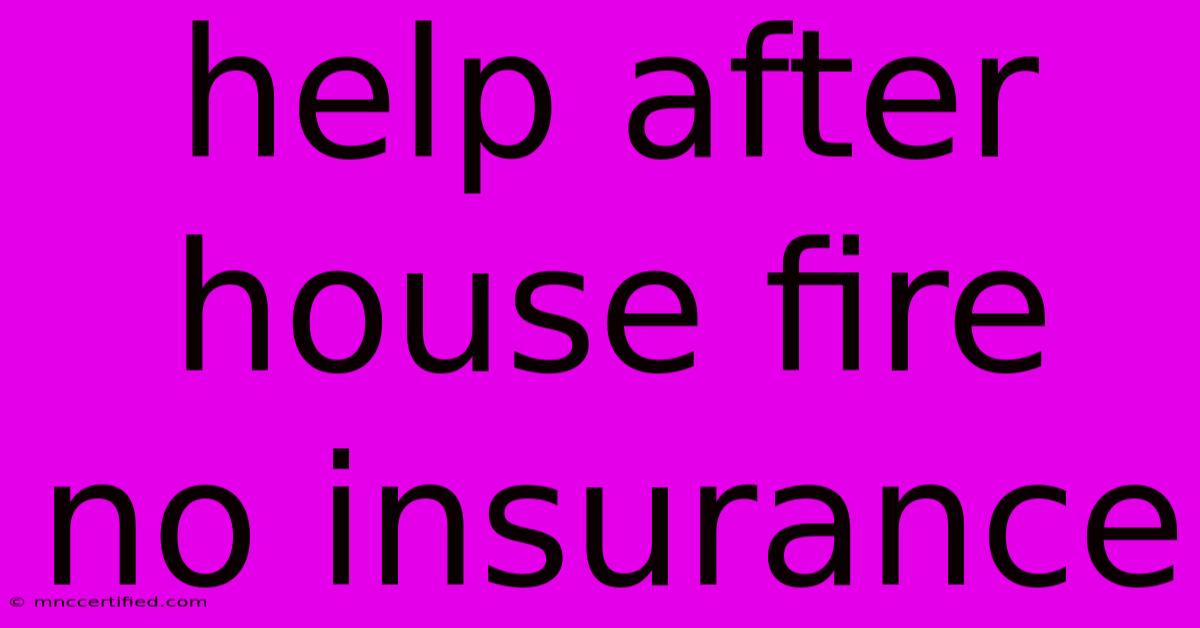Help After House Fire No Insurance

Table of Contents
Help After a House Fire: Navigating the Aftermath Without Insurance
A house fire is a devastating event, leaving victims reeling from loss and facing an uncertain future. The situation becomes even more challenging when you don't have homeowners or renters insurance. This guide offers crucial steps to take and resources available to help you rebuild your life after a fire, even without insurance coverage.
Immediate Actions After a House Fire (No Insurance)
The first few hours and days following a fire are critical. Your immediate priorities are safety and securing what remains.
1. Ensure Your Safety and the Safety of Others:
- Seek medical attention: Address any injuries sustained during the fire, no matter how minor they seem.
- Find temporary shelter: If your home is uninhabitable, contact friends, family, or a local shelter for temporary housing. The Red Cross often provides immediate disaster relief, including temporary lodging and essentials.
- Contact emergency services: Report the fire to the appropriate authorities and let them know you're uninsured. This is important for documentation and potential future aid.
2. Document the Damage:
- Take photos and videos: Thoroughly document the damage to your property and belongings. This is crucial evidence for seeking assistance.
- Create an inventory: List all lost or damaged items, including appliances, furniture, clothing, and personal documents. Include purchase dates and estimated values where possible. This will be essential for future claims or aid applications.
- Preserve any salvageable items: Carefully remove undamaged items from the property, taking precautions to avoid further damage or injury.
Seeking Help After a House Fire Without Insurance
Facing a house fire without insurance coverage can feel overwhelming, but several avenues can provide assistance.
1. Government Assistance Programs:
Several federal, state, and local programs might offer aid. Research programs in your area focused on disaster relief and housing assistance. This may include:
- FEMA (Federal Emergency Management Agency): Even without insurance, FEMA might offer grants for temporary housing, home repairs, and other essential needs. Check their website for eligibility requirements and application processes.
- State and Local Government Programs: Many states and municipalities have their own disaster relief programs that can provide financial aid, housing assistance, and other services. Contact your local government agencies for information specific to your area.
- Unemployment Benefits: If the fire resulted in job loss due to damage to your place of business or lack of childcare, you might qualify for unemployment benefits.
2. Charitable Organizations and Non-Profits:
Numerous charitable organizations provide support to fire victims.
- The American Red Cross: Offers immediate disaster relief, including temporary housing, food, and clothing.
- Salvation Army: Provides a range of services, from emergency shelter to financial assistance.
- Local Churches and Community Groups: Often offer assistance to community members in times of need.
3. Community Support and Crowdfunding:
Don't underestimate the power of community support.
- Reach out to friends and family: Let your support network know about your situation. They might offer help with temporary housing, food, clothing, or financial assistance.
- Consider crowdfunding: Platforms like GoFundMe or Kickstarter allow you to create a campaign to solicit donations from a wider audience.
4. Legal and Financial Advice:
- Seek legal counsel: A lawyer can help navigate any legal issues related to the fire, such as landlord-tenant disputes or property damage claims.
- Contact a financial advisor: Discuss your options for rebuilding your finances after such a significant loss.
Preventing Future Fires: A Crucial Step
The aftermath of a house fire is a difficult experience. Taking proactive steps to prevent future fires is essential. This includes regular maintenance of electrical systems, smoke detector checks, and fire safety education for your family.
Conclusion: Hope After the Flames
Losing your home in a fire is incredibly challenging, particularly without insurance. However, by taking immediate action, proactively seeking assistance, and utilizing the available resources, you can begin to rebuild your life and find stability. Remember that help is available, and you are not alone in this difficult journey. Reach out for help – it's a crucial step towards recovery.

Thank you for visiting our website wich cover about Help After House Fire No Insurance. We hope the information provided has been useful to you. Feel free to contact us if you have any questions or need further assistance. See you next time and dont miss to bookmark.
Featured Posts
-
Argentina Suffers 2 1 Defeat To Paraguay
Nov 15, 2024
-
World Cup Qualifiers Paraguay Vs Argentina Highlights
Nov 15, 2024
-
Rfk Jr Named Us Health Chief By Trump
Nov 15, 2024
-
Rfk Jr As Trumps Pick Whats His Record
Nov 15, 2024
-
Bond Energy Worksheet With Answers
Nov 15, 2024